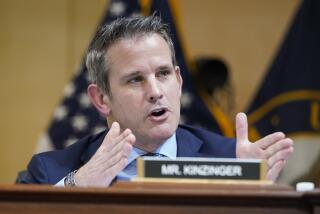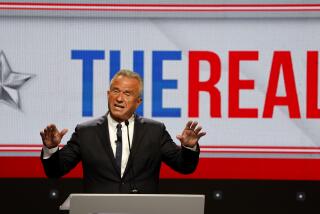Talks by 7 Moderate Politicians Point Up Room for a Centrist Third Party in 1996 : Presidency: Polls show most Americans are open to idea. Group hasn’t decided if it will launch candidacy, and may lack strong horse even if it does.
- Share via
WASHINGTON — Recent discussions among a series of seven moderate politicians about launching a new political movement underscore the opportunities and continuing obstacles facing anyone hoping to marshal the discontent with the two major parties.
Polls now show a majority of Americans are open to a third party. Former Democratic Sen. Paul E. Tsongas of Massachusetts, one of the participants in the talks, says there is “a huge vacuum in the center” for a movement that could launch an independent presidential candidacy. But the gang of seven, whose efforts were first disclosed Sunday in Time magazine, face substantial hurdles in filling that hole.
For one thing, the group has not decided whether it wants to launch an independent candidacy--and may lack a strong horse even if it does. Though former Gov. Lowell P. Weicker Jr. of Connecticut and retiring Sen. Bill Bradley (D-N.J.), two of the participants, have been considering an independent candidacy, neither would enter a race with a strong national following.
“I thought when Colin [L.] Powell decided not to run [as an independent] the dynamics available to us changed,” Tsongas said, “because there is an enormous drop-off between Colin Powell and anybody else.”
Limited Appeal
Even if the group had a candidate, its members embody a largely suburban strain of political reform that may have limited appeal to the largest block of disaffected voters in the electorate: working-class Americans whose incomes have been under pressure for the past 20 years.
“There is all this seething populist anger out there that this group of people, it seems, wouldn’t have a prayer of appealing to,” says Ruy Teixeira, a political analyst at the left-leaning Economic Policy Institute in Washington.
Reports of the group’s maneuvers, which carry the potential to further destabilize the 1996 race, come as the Republican presidential race continued to harden into shape.
Gingrich Won’t Run
On Monday, House Speaker Newt Gingrich formally announced that he would not seek the Republican presidential nomination. “Frankly, looking at the daunting challenge of trying to organize a national campaign . . . I didn’t see how I could both be Speaker of the House and be in a position to mount a campaign on that scale,” Gingrich told a news conference in Marietta, Ga.
The decision by Gingrich, a favorite of Republican conservatives, not to run further entrenched Senate Majority Leader Bob Dole’s position as front-runner. On Monday, Dole picked up the endorsement of popular Wisconsin Gov. Tommy G. Thompson--who became the 16th of the 31 Republican governors to endorse Dole.
The gang of seven’s meetings reflect the continued belief among some analysts that many voters are open to other alternatives if the 1996 election--as now appears likely--offers a choice between Dole and President Clinton.
As reported by Time and confirmed by Tsongas, other members of the group include former Colorado Gov. Richard D. Lamm, former Sen. Gary Hart of Colorado, former Rep. Timothy J. Penny of Minnesota and Bradley, all Democrats; Weicker, a former Republican senator who served one term as an independent governor in Connecticut, and Maine Gov. Angus King, an independent.
What unites the gang of seven is a similar approach to politics. With only some dissents, they generally offer a blend of fiscal conservatism, social liberalism, enthusiasm for political reform and environmental protection and an internationalist orientation reflected in support for free trade and active military engagement abroad.
That combination, analysts note, speaks to one component of the voters disaffected from the two major parties: better educated, more affluent voters, a group often described as the sensible center. “This is the Park Avenue, Bel-Air, R Street kind of axis,” said Democratic political consultant James Carville, an adviser to Clinton. “You are going to find these are people who hang out in nice restaurants and drive foreign cars.”
But the larger constituency for a potential independent movement may be what is often termed the radical middle: voters without college degrees receptive to populist attacks on Washington and resistance to free trade and American military involvement abroad.
In a recent Los Angeles Times Poll, 14% of voters said they were very likely to identify with a political movement that embraced most of the positions associated with the “sensible center.”
In contrast, 43% said they were very likely to identify with a political movement whose principles included opposition to imports and military engagement abroad. Support for those principles was much greater among voters with less education than among those with college degrees.
Given that, reaching out beyond the suburbs to less-educated voters could be the greatest challenge for any candidate from the gang of seven. If economic nationalism is the key to reaching voters angry with both parties, Tsongas said, “then our group has nothing to say.”
The Perot Problem
Moreover, even if the group could surmount those obstacles, it faces what might be called the Perot problem.
On the one hand, it may be impossible for any independent candidate to seriously bid for the White House without winning support from voters attracted to Texas billionaire Ross Perot. But any politician who accepts Perot’s endorsement, or the nomination of the Independence Party he is now organizing, risks being branded as a puppet of the mercurial businessman. “The problem that any candidate would inevitably face is the issue of how could you be independent of someone who put all this together,” Tsongas said.
So far, the group has held two extended conversations, without reaching any clear consensus on its course of action. “It is not clear what it is leading to,” said one source close to Bradley, “or if it is leading to anything.”
The group’s most immediate focus has been to produce a statement of principles, which Lamm has been attempting to write based on papers submitted by the other participants, Tsongas said.
“At a minimum we will try to put on paper what we think is the philosophy that the two major parties should follow as a challenge,” Tsongas said. “The other possibility is that somebody runs [for President].”
Both Weicker and Bradley have discussed the possibility of seeking the White House as an independent in 1996. Weicker talked openly of a potential candidacy last summer while promoting his recently published memoirs, but has kept a lower profile since.
Since announcing last summer that he would not seek reelection to the Senate next year, Bradley has conducted several quiet visits to cities around the country, delivering speeches and meeting with private citizens. But sources close to Bradley say he has made no decision to run, taken no steps toward exploring a candidacy and viewed the gang of seven’s meetings more as an opportunity to explore ideas for invigorating the political system than as the platform from which to launch a candidacy.
“I don’t think from Bradley’s point of view that it is candidate-driven,” said one Bradley associate.
More to Read
Get the L.A. Times Politics newsletter
Deeply reported insights into legislation, politics and policy from Sacramento, Washington and beyond. In your inbox twice per week.
You may occasionally receive promotional content from the Los Angeles Times.










